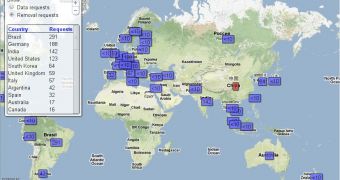Google has been getting a lot of flack for its supposed disregard of user privacy. The Google Buzz fiasco is still fresh in everyone’s mind and privacy regulators, especially in Europe, are increasingly critical of Google. But it goes both ways, when it suits them, governments will forget all about user privacy. Google, just like any other large web company, is always getting requests to remove content or disclose private data about users from governments around the world. And, now, it has decided to make a bold move and show everyone just how many requests it gets and from whom.
“We are today launching a new Government Requests tool to give people information about the requests for user data or content removal we receive from government agencies around the world,” David Drummond, SVP, Corporate Development and Chief Legal Officer at Google, wrote.
The data that Google made available is just for the six months between July 2009 and December 2009. The company says it plans to update the data every six months. There are a few caveats, for example, a request may be for more than one removal or for data on more individuals.
According to the data, Brazil is the most eager country when it comes to requests for data, which total 3,663, and also the 291 removal requests. The US follows in terms of data requests, which add up to 3,580, and Germany in terms of removals, amounting to 188. Brazil being the ‘top’ country may be explained by the popularity of Orkut, a social network owned by Google there.
Even though it makes the data available, Google doesn’t try to incriminate anyone, as most of these requests are legitimate. Also, not all the data is available, as local laws may prevent Google from releasing it publicly. There is no data on China, for example.
“Google, like other technology and telecommunications companies, regularly receives demands from government agencies to remove content from our services. Of course many of these requests are entirely legitimate,” Drummond explained. “We also regularly receive requests from law enforcement agencies to hand over private user data. Again, the vast majority of these requests are valid and the information needed is for legitimate criminal investigations,” he added.

 14 DAY TRIAL //
14 DAY TRIAL //